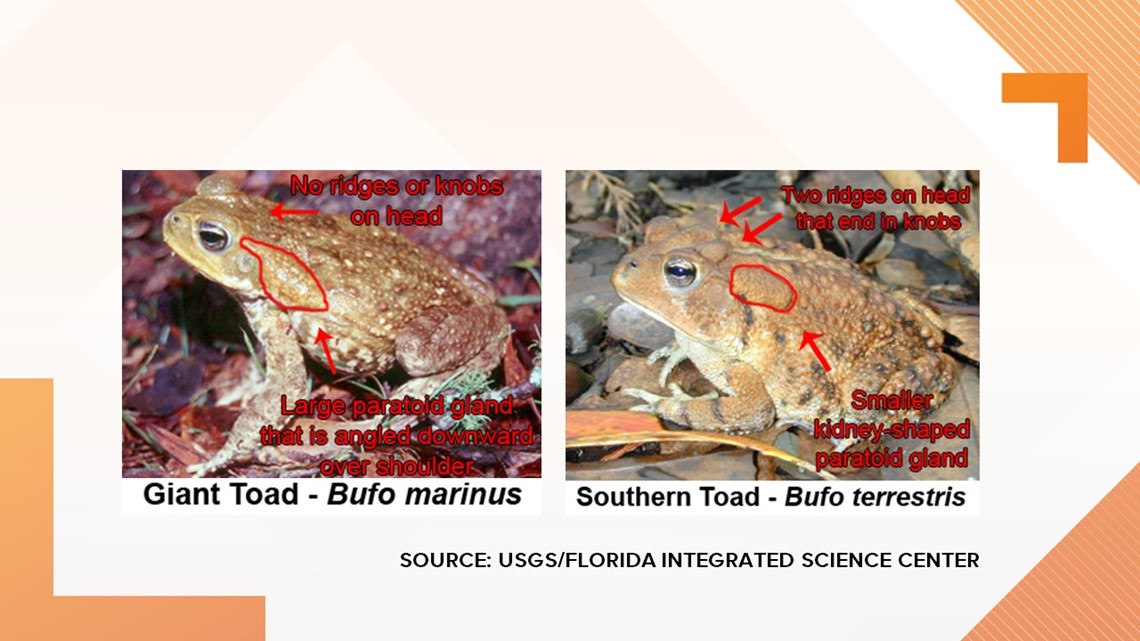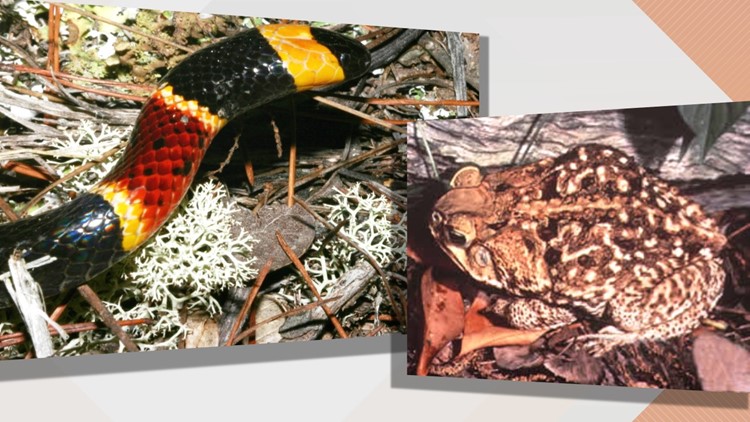ST. PETERSBURG, Fla. -- An early start to the state's rainy season is bringing out the creatures that could cause pets to croak.
The giant toads -- commonly called Bufo toads or Cane toads -- are fat, palm-sized reptiles that secrete a poison toward the top of their heads. It's that toxic, milky substance that can irritate humans if it gets onto skin and kill dogs or cats if swallowed.
During the dry and cooler seasons, the toads burrow in the ground and hibernate. Florida's recent, drought-busting rainfall has caused the animals to dig themselves out become more active in search of food and reproduce in any body of fresh water.
The Bufo toad isn't native to Florida. Humans brought it here. The toads were released to help control larvae in the state's sugar cane fields decades ago, according to the University of Florida.
By accident, 100 of the creatures hopped away from the Miami airport in 1955, leading to most of the growing population today.
How to spot (and hear) the bufo toad
Any toad in Florida larger than four inches likely is not a native species, according to U-F.
They are, naturally warty creatures with varying shades of tan to brown. In addition to their size, people can identify the Bufo toad by the triangular-looking glands on its shoulders. This is the area where the poison is secreted.
The native southern toad has more of an oval-looking gland. Plus, native toads have ridges or "crests" on top of their heads -- the bufo toad does not, U-F says.
They're loud, too, sounding like an "idling diesel engine" (listen to the call).


Help! My pet ate one! Now what?
Run water through the pet's mouth to get rid of any toxin. It's also recommended you use your fingers to rub the animal's gums and mouth to help remove as much of the poison as possible.
Next, call your veterinarian -- immediately.
"Dogs will chase cane toads and bite them, which can release toxins from the toads' saliva glands," said Dr. John Gicking of BluePearl Veterinary Partners. "Dogs can die, especially if they eat the toad."
If you didn't catch your pet eating one but notice them acting strange, check for symptoms: red gums, excessive drooling, crying and in worst-case scenarios, convulsions, according to U-F.
"The classic signs are drooling, brick-red gums and irritation of the mouth," Gicking said. "Dogs also can become hyperactive and even have seizures."
What can pet owners do about them?
Gicking recommends pet owners keep a close watch on their animals while outside and for dogs, keep them on a leash.
Now, there is a humane way of killing the invasive toad and limiting its spread.
U-F recommends to rub or spray 20-percent benzocaine toothache gel or sunburn spray (not 5-percent lidocaine) on the toad's lower belly. It will become unconscious in a few minutes. From there, the toad can be put in a plastic bag and placed in a freezer.
After 24-48 hours, it will be dead.
Another Florida risk: snakes
As if there's another thing to worry about aside from alligators and toads and other things that can seriously injure you, there's the eastern coral snake.
WINK-TV reports a southwest Florida man on June 2 picked up a snake, not knowing what it was. It bit him, and he was taken to an area hospital for treatment.
His condition is not known.
The venom of a coral snake is among the most potent in North America, according to the Florida Fish and Wildlife Conservation Commission. It's easy to identify with this rhyme: "red touch yellow, kill a fellow; red touch black, good for Jack."
Antivenom for coral snakes is in supply; but once depleted, there will be no more. The Florida Poison Control Center says the producer of the antivenom, Pfizer/Wyeth, no longer is making it. However, the company says it plans on reintroducing it at a later date.
►Make it easy to keep up-to-date with more stories like this. Download the 10News app now.
Have a news tip? Email desk@wtsp.com, or visit our Facebook page or Twitter feed.



